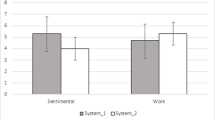Abstract
A methodology about personal project was used to understand perceived life satisfaction. Variables derived from the Personal Project Matrix were shown to explain variability in reported life satisfaction in two separate studies (university and professional samples). The results indicated that personal projects of students had been organized in systems and these systems' properties had meaningful effects on life satisfaction. A cross-validation analysis revealed that professionals' projects did not show the same systemic feature which students' projects had. But some variables such as projects performed in general places, stress, and amount of reported obstacles discriminated life satisfaction scores meaningfully.
Similar content being viewed by others
References
Bilgin, N., Yetim, Ü. and Gökten, M.: 1991, Searching a Democratic Modal for Local Governments: A Study Based on People's Evaluations of Their Residential Satisfaction, Life Satisfaction, and Political Participation (In Turkish) (The Social Democratic Studies Foundation Publication, Ankara, Turkey).
Bilgin, N., Ergenç, A. and Timurcanday, Ö.: 1985, Perceived Life Quality: A Descriptive Study (In Turkish). Seminar, Ege University Faculty of Letters Publication, 4, 157–170.
Campbell, A., Converse, P. E. and Rodgers, W. L.: 1976, The Quality of American Life (New York: Russell Sage).
Chekola, M. G.: 1975, The Concept of Happiness (Doctoral dissertation, University of Michigan, 1974). Disseration Abstracts International, 35, 46095A (University microfilms no. 75–655).
Diener, E.: 1984, ‘Subjective well-being’, Psychological Bulletin 95, 542–575.
Diener, E., Emmons, R. A., Larsen, R. J. and Griffin, S.: 1985, ‘The satisfaction with life scale’, Journal of Personality Assessment 49, 71–75.
Larsen, R. J., Diener, E. and Emmons, R. A.: 1983, Validity and Meaning of Measures of Subjective Well-Being. Paper presented at the Midwestern Psychological Association Convention, Chicago.
Little, B. R.: 1983, ‘Personal projects: A rationale and method for investigation’, Environment and Behavior 15, 273–309.
Little, B. R.: 1977, ‘St. George's griddles’, Contemporary Psychology 22, 759–761.
Michalos, A. C.: 1985, ‘Multiple discrepancies theory (MDT)’, Social Indicators Research 16, 347–413.
Palys, T. S. and Little, B. R.: 1983, ‘Perceived life satisfaction and the organization of personal project systems’, Journal of Personality and Social Psychology 44, 1221–1230.
Yetim, Ü.: 1985, Quality of Life Perceptions Amongst People of Different Socio-Cultural Origins: A Study of Life Events (In Turkish). Seminar, Ege University Faculty of Letters Publication 4, 144–156.
Yetim, Ü.: 1991, Reliability and Validity of Satisfaction With Life Scale in Turkish Form (In Turkish). Paper presented to the 6th National Psychology Conference, Istanbul, Turkey. In the State of Art Lectures of 6th National Psychology Conference Book, 200–206, Istanbul University Publication.
Author information
Authors and Affiliations
Rights and permissions
About this article
Cite this article
Yetİm, Ü. Life satisfaction: A study based on the organization of personal projects. Soc Indic Res 29, 277–289 (1993). https://doi.org/10.1007/BF01079516
Accepted:
Issue Date:
DOI: https://doi.org/10.1007/BF01079516




